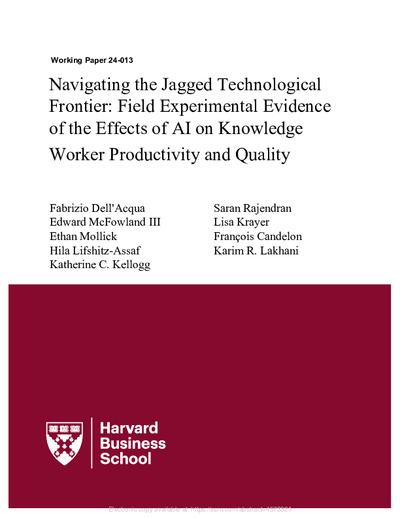 Zusammenfassungen
Zusammenfassungen
The public release of Large Language Models (LLMs) has sparked tremendous interest in how humans will use Artificial Intelligence (AI) to accomplish a variety of tasks. In our study conducted with Boston Consulting Group, a global management consulting firm, we examine the performance implications of AI on realistic, complex, and knowledge-intensive tasks. The pre-registered experiment involved 758 consultants comprising about 7% of the individual contributor-level consultants at the company. After establishing a performance baseline on a similar task, subjects were randomly assigned to one of three conditions: no AI access, GPT-4 AI access, or GPT-4 AI access with a prompt engineering overview. We suggest that the capabilities of AI create a “jagged technological frontier” where some tasks are easily done by AI, while others, though seemingly similar in difficulty level, are outside the current capability of AI. For each one of a set of 18 realistic consulting tasks within the frontier of AI capabilities, consultants using AI were significantly more productive (they completed 12.2% more tasks on average, and completed task 25.1% more quickly), and produced significantly higher quality results (more than 40% higher quality compared to a control group). Consultants across the skills distribution benefited significantly from having AI augmentation, with those below the average performance threshold increasing by 43% and those above increasing by 17% compared to their own scores. For a task selected to be outside the frontier, however, consultants using AI were 19 percentage points less likely to produce correct solutions compared to those without AI. Further, our analysis shows the emergence of two distinctive patterns of successful AI use by humans along a spectrum of human-AI integration. One set of consultants acted as “Centaurs,” like the mythical halfhorse/half-human creature, dividing and delegating their solution-creation activities to the AI or to themselves. Another set of consultants acted more like “Cyborgs,” completely integrating their task flow with the AI and continually interacting with the technology.
Von Fabrizio Dell'Acqua, Saran Rajendran, Edward McFowland III, Lisa Krayer, Ethan Mollick, François Candelon, Hila Lifshitz-Assaf, Karim R. Lakhani, Katherine C. Kellogg im Text Navigating the Jagged Technological Frontier (2023)  Dieser Text erwähnt ...
Dieser Text erwähnt ...
 Dieser Text erwähnt vermutlich nicht ...
Dieser Text erwähnt vermutlich nicht ... 
 Nicht erwähnte Begriffe | Chat-GPT, Generative Pretrained Transformer 3 (GPT-3), GMLS & Bildung, Intelligenz |
 Tagcloud
Tagcloud
 Zitationsgraph
Zitationsgraph
 Zitationsgraph (Beta-Test mit vis.js)
Zitationsgraph (Beta-Test mit vis.js)
 2 Erwähnungen
2 Erwähnungen 
- Generative KI macht Wissensarbeiter 25 Prozent schneller und 40 Prozent besser (Holger Schmidt) (2023)


- ChatGPT senkt Beschäftigung und Verdienste der Autoren (Holger Schmidt) (2023)


 Anderswo finden
Anderswo finden
 Volltext dieses Dokuments
Volltext dieses Dokuments
 |  Navigating the Jagged Technological Frontier: Artikel als Volltext ( Navigating the Jagged Technological Frontier: Artikel als Volltext ( : :  , 3134 kByte; , 3134 kByte;  : :  ) ) |
 Anderswo suchen
Anderswo suchen 
 Beat und dieser Text
Beat und dieser Text
Beat hat Dieser Text während seiner Zeit am Institut für Medien und Schule (IMS) ins Biblionetz aufgenommen. Beat besitzt kein physisches, aber ein digitales Exemplar. Eine digitale Version ist auf dem Internet verfügbar (s.o.). Es gibt bisher nur wenige Objekte im Biblionetz, die dieses Werk zitieren.










 Generative Machine-Learning-Systeme (GMLS)
Generative Machine-Learning-Systeme (GMLS) Generative Pretrained Transformer 4 (GPT-4)
Generative Pretrained Transformer 4 (GPT-4) Kreativität
Kreativität Künstliche Intelligenz (KI / AI)
Künstliche Intelligenz (KI / AI) Management
Management Produktivität
Produktivität





 Biblionetz-History
Biblionetz-History